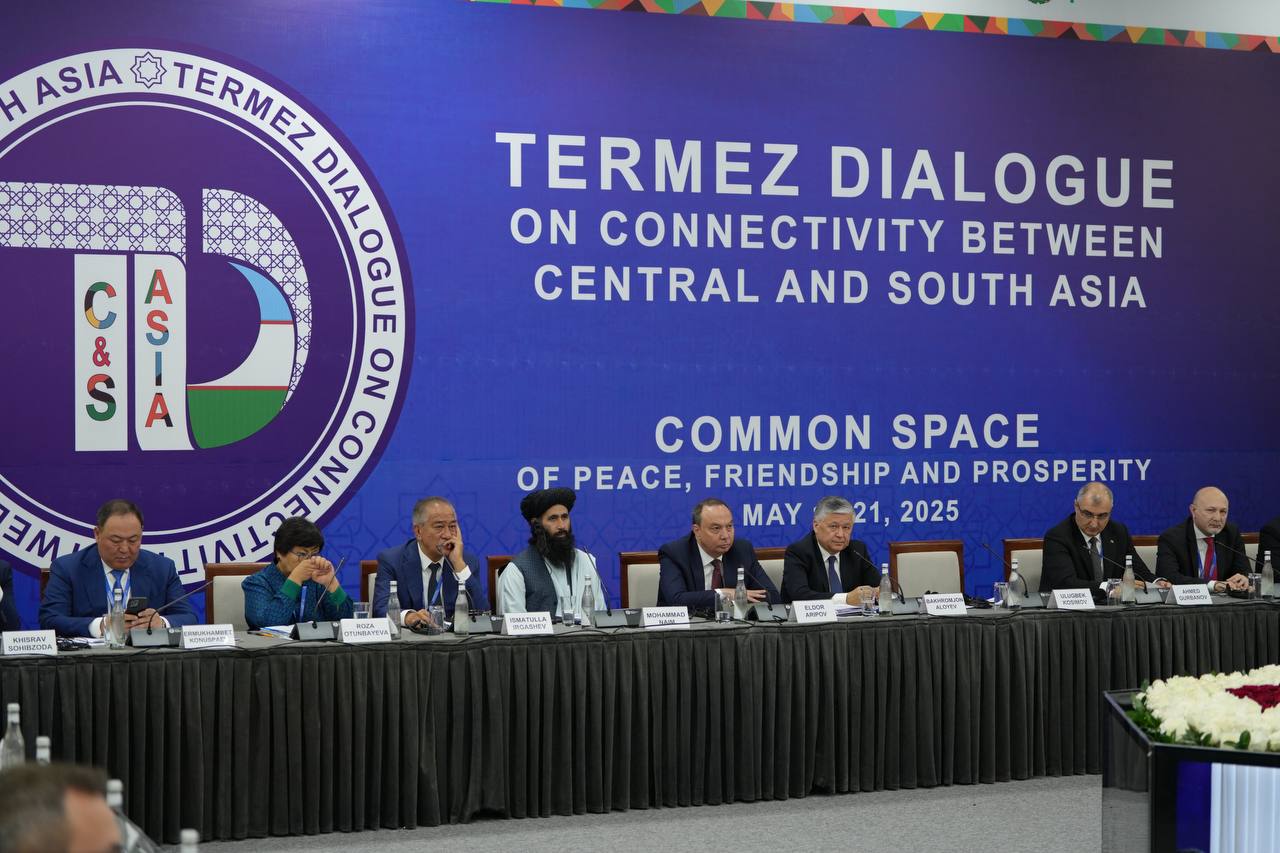

Termez Dialogue on Connectivity between Central and South Asia

From May 19 to 21, 2025, the city of Termez hosted the first meeting of the Termez Dialogue on Connectivity between Central and South Asia under the theme “Building a Common Space of Peace, Friendship, and Prosperity.” This international forum is being organized in cooperation with the Institute for Strategic and Regional Studies under the President of the Republic of Uzbekistan, the Center for Progressive Reforms, the Ministry of Foreign Affairs, and the Chamber of Commerce and Industry.
The forum brought together around 200 representatives from political, economic, and business circles, financial institutions, and international and regional organizations from Central and South Asia, Europe, the Commonwealth of Independent States, the Asia-Pacific region, the Americas, and the Middle East. It also welcomed prominent experts from leading analytical and research centers around the world.
Participants in the Termez Dialogue included representatives from international and regional organizations such as the United Nations Assistance Mission in Afghanistan (UNAMA), the UN Regional Centre for Preventive Diplomacy for Central Asia (UNRCCA), the Shanghai Cooperation Organization (SCO), the Commonwealth of Independent States (CIS), the United Nations Development Programme (UNDP), the Office of the United Nations High Commissioner for Refugees (UNHCR), the Organization for Security and Co-operation in Europe (OSCE), the International Organization for Migration (IOM), as well as heads and specialists from the Center for Progressive Reforms and the Conference on Interaction and Confidence Building Measures in Asia (CICA).
The main objective of the Termez Dialogue is to establish a multilateral platform for dialogue aimed at practically advancing the resolution “Strengthening connectivity between Central and South Asia,” which was initiated by the President of the Republic of Uzbekistan, Shavkat Mirziyoyev, and supported by the United Nations General Assembly in 2022.
The forum addressed the following key issues:
– Strengthening cooperation to ensure security, stability, and sustainable development between Central and South Asia;
– Expanding the role of the private sector and financial institutions in deepening interregional connectivity and promoting economic growth;
– Utilizing the potential of expert-level dialogue.
The Termez Dialogue is intended to serve as a permanent platform for advancing interregional connectivity and identifying prospects for ensuring peace, security, and stability across the broader Eurasian continent. The event was held at the "Termez International Trade Center" in the Surkhandarya region, in the city of Termez.
Within the framework of the forum, various panel sessions, roundtable discussions, and bilateral meetings were held. Participants discussed promising plans in ensuring regional security, educational exchange among youth, cultural cooperation, and the development of tourism.
Participants identified several key areas as priority directions for cooperation between Central and South Asia. First and foremost, the necessity of maintaining regular political dialogue at the highest levels was emphasized. The importance of uniting efforts to address shared threats and challenges to stability and security was also highlighted. Additionally, creating favorable conditions for the development of trade and economic relations and establishing a common transport connectivity architecture were included among the top priorities.
In his opening remarks, Eldor Aripov, Director of the Institute for Strategic and Regional Studies, stressed that the Termiz Dialogue is not merely a diplomatic gathering, but a strategic initiative aimed at strengthening regional economic, political, and cultural connectivity. “We are witnessing new momentum in regional connectivity, and the Termez Dialogue is precisely a platform where ideas are shaped and partnerships are built,” – Aripov said.
Moreover, participants proposed expanding cooperation in the introduction of digital technologies in areas such as international trade, customs control, transportation, banking and finance, healthcare, education, science, and culture. The importance of jointly exploring ways to ensure food security across the vast macro-region of Eurasia, promoting environmental protection, and encouraging “green” development was also noted. Other significant proposals included unlocking the unique tourism potential of Central and South Asia, enhancing cultural and humanitarian exchanges to strengthen friendship and trust, fostering close cooperation in science, technology, and innovation, and expanding engagement between the youth and civil society representatives of the two regions.
Svante E. Cornell, Co-founder and Director of the Institute for Security and Development Policy (ISDP) and Head of the Central Asia–Caucasus Institute, emphasized the strategic significance of opening a southern trade corridor. “Such a route not only stimulates economic growth but also contributes to long-term political stability across Central Asia,” – he stated.
Overall, enhancing cooperation between the countries of Central and South Asia in the aforementioned areas creates a "mutually beneficial" situation and generates both economic and political advantages.
The Termiz Dialogue contributed to further strengthening cooperation between the Central and South Asian states, based on mutual trust, friendship, and sustainable development. This initiative became an important step toward enhancing the region’s standing in the global economy and contributing to international peace and progress.
“Ongoing efforts in Uzbekistan, in partnership with international stakeholders, include the modernization of energy systems, expansion of renewable energy sources, and implementation of advanced water resource management solutions. We are ready to share our experience in these areas with Afghanistan, where climate adaptation is especially critical. Today, we invite all governments and organizations participating here to join us in building an environmentally sustainable region – by protecting our shared environment and ensuring the security of future generations,” – said Mirshohid Aslanov, CEO of the Center for Progressive Reforms.
At the conclusion of the forum, a Communiqué was adopted, calling for unified efforts to strengthen trust, dialogue, and cooperation between Central and South Asia. The event emphasized that connectivity, cooperation, and trust are becoming the fundamental pillars of security and stability across the entire macro-region. Expanding interregional ties lays the groundwork for mutually acceptable solutions to shared challenges and enables effective responses to current threats and risks.